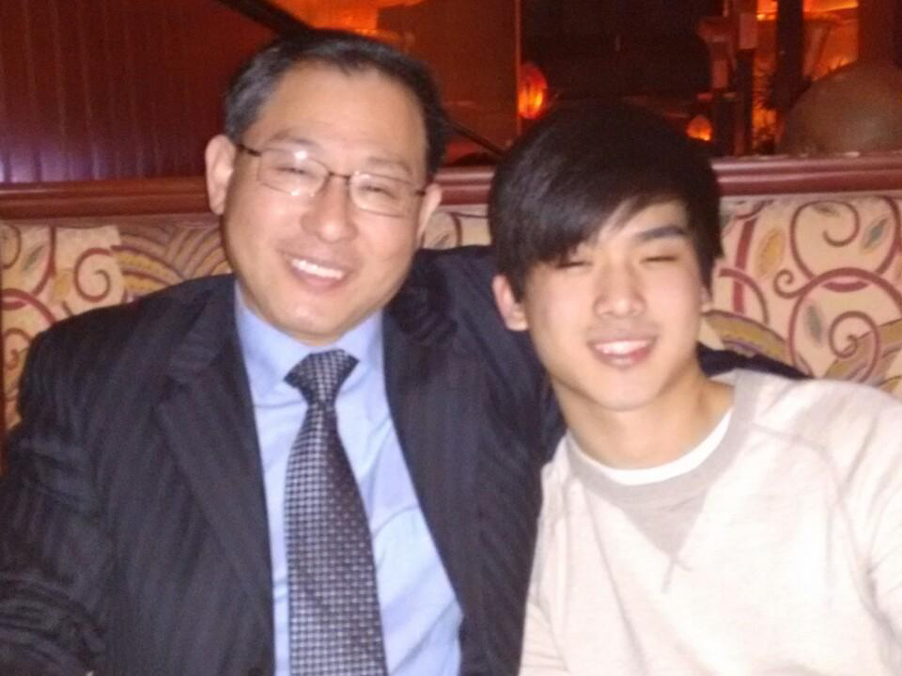The Secret to Bonding with Your Korean Dad

In my junior year of high school, my father burst into my room and said, “Philip, can we talk?” Before I could answer, he sat on the edge of my bed and motioned me to come sit next to him. On the inside, I was terrified, because my father and I seldom had heart to heart conversations unless he had a hankering to lecture me about God and the power of his unconditional love.
As I awkwardly sat next to him, nothing could’ve prepared me for our next conversation:
“Philip. Do you like girls?” he asked with a deadpan face.
“Uh… yes, I do,” I responded truthfully.
“Okay,” he replied, then rigidly gave me a side hug and left.
He means well, but my father’s communication style makes no sense to me. And although I knew that my dad took financial care of me, there was always this disconnect between us while I was growing up. My father and I would wrack our brains trying to come up with fun activities where we could bond. We tried passing around the soccer ball, fishing, camping — basically, any activity you would see in a movie montage scene where the estranged, out of touch father tries extra hard to win his children’s affection. As much as I appreciated his efforts and attempted to reciprocate, we never really clicked, and after trying various activities together, we realized maybe the best way to love each other was from a healthy distance. We even experimented with having candid conversations about religion, but, as it turned out, we have two very different perspectives.
Our inability to bond mainly stems from a lack of common interests and a language barrier. There are three pillars that make up my father’s life: Church, business, and social status. As a first-generation Korean American, my dad faced many hardships growing up in South Korea, like losing his father when he was four years old. So, when he immigrated to Fayetteville, NC in hopes of chasing the American Dream, he turned to the city’s Korean Presbyterian church for refuge and community. As the years went by, he eventually rose in social status and became the youngest person to be instated as an Elder at our church, which may not sound like a big deal, but was seen as a great honor in Fayetteville’s Korean community. Since immigrant Koreans didn’t enter local politics, church was where all the power was held for Korean Americans. The pastor was our president, the Council of Elders were our Senators, and the deacons were the House of Representatives.
So, I completely understand why he’s religious and am genuinely thankful he can turn to God for strength whenever he faces obstacles that are out of his control. However, as for me, I am agnostic and jaded when it comes to Christianity, with years of unpleasant childhood memories of being raised in a strict religious household. I went to church to please my family, and to this very day, I still play the role of the perfect son whenever I see a Korean person that knows my family. My values just aren’t centered around religion or social status, but rather an affinity for comedy, music, and family. Also, as a second-generation Korean American, I never felt the need to devote my social life solely to the Korean community.
Another reason it is difficult to bond with my dad is that we have a hard time simply conversing in the same language. Our phone calls will last an average of one minute, where my father tries his absolute best to speak to me in broken English, and I try to talk to him armed with the vocabulary of a 5-year-old Korean kid.

However, there’s one thing we both agree on. We love greasy, diabetes-inducing, all-you-can-eat Chinese buffets. Our shared philosophy on them is: “The Shittier, The Better.” Our favorite one in particular, Super King Buffet, has constantly slippery floors, booth seats badly cracked from decades of supporting the butts of thousands of hungry customers, and permanently sticky tables no matter how many napkins you use to wipe them.
Whenever we go, we have this delicate system in place that we strictly follow. In the first round, I get us a plate of crawfish, while my father goes to the hibachi station and orders a big enough plate for the both of us. I usually get to the booth first, and my dad will come soon after carrying a minimum of three plates. My dad will bow his head in private prayer, and I will follow his lead, mumbling a few words under my breath to make it look believable, and time my vocal “Amen” perfectly to chime in with his when he’s done saying grace.
As we begin eating, we sit in comfortable silence. I put my phone on Do Not Disturb and my dad will ignore all his calls. And I don’t know if it’s the sugar from the delicious sweet and sour chicken or the ambiance of the restaurant, but at that moment, something enchanting happens where my father and I finally feel comfortable around each other. It’s at Super King Buffet where I’ve learned the most about my dad; it’s the place where we both feel safe enough to open up, and I know I can ask my dad about anything. I’ve learned more about where his almost-delusional confidence comes from, about how to conduct business and mistakes he wished he had avoided.
Although we have never spoken about it, my father also understands in order for us to maintain peace at Super King Buffet, he is not allowed to talk about God, especially when he’s giving me advice. However, in an effort to bridge the gap between us I’ll meet him in the middle and ask him a generic question about the Holy Spirit, and patiently listen as his eyes light up with passion and he goes on a 30-minute sermon.
Being a second-generation Asian American is an awkward experience. We’re constantly trying to find the perfect blend of being in touch with our Asian heritage while maintaining our Americanness. It’s exhausting looking for a way to relate to parents who were raised in totally different environments, have different sets of values, and speak different languages from ourselves. Sharing one thing — even if that’s the love of greasy buffets — is enough to build a relationship on. In times of heightened anxiety while I’m living across the country, I miss spending time with my dad, awkwardness and all. As I reflect during quarantine, I’ve come to appreciate the fact that he provides a feeling of great comfort and love in my life that I often take for granted. I can’t wait to see him, and to eat together at Super King Buffet once again.